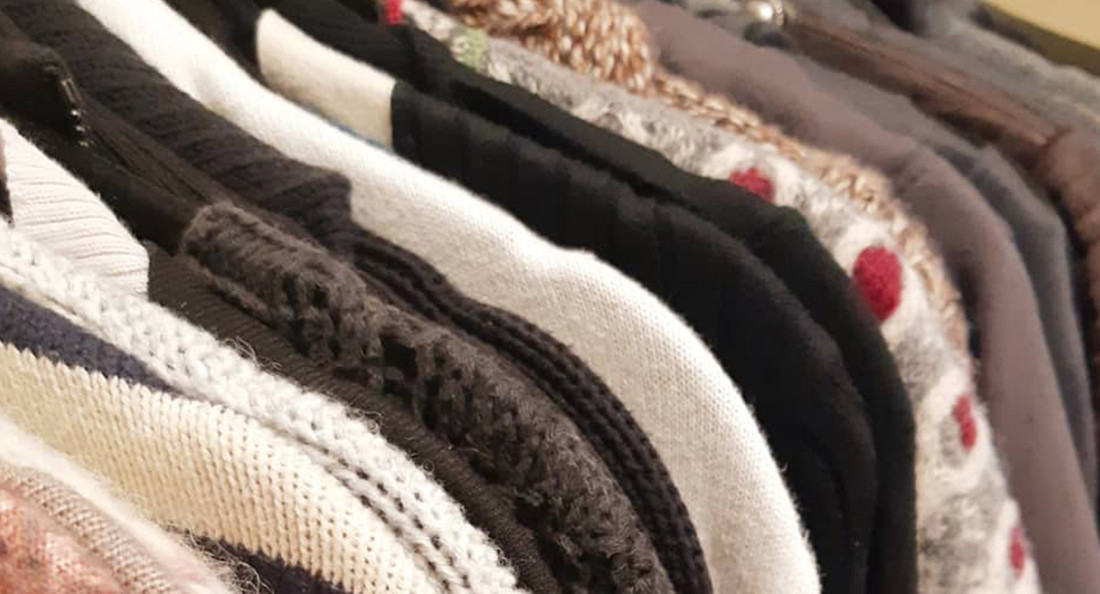She resells thrifted seashells via an online store
The socioeconomic and ecological implications of thrift reselling
Thrift reselling is the growing practice of purchasing items from thrift stores and reselling them at a markup. A thredUP 2020 resale report combining data from COVID and pre-COVID times says “resale is expected to overtake the traditional thrift and donation segment by 2024.”
While resale grows in popularity, there’s ongoing online discussion about the ethics of reselling. Many popular anti-resale claims are summarized in this sarcastic tweet from @daniilarochelle: “huge shoutout to all the Instagram thrift accounts for selling used items at retail price, snatching up all of the cute clothes and causing thrift stores to raise their prices in order to prevent people from reselling at ‘vintage’ prices.”
As reselling evolves, debates around its ethics do, too. The increasing urgency of the climate crisis, consumerism and now COVID add new layers to the conversation.
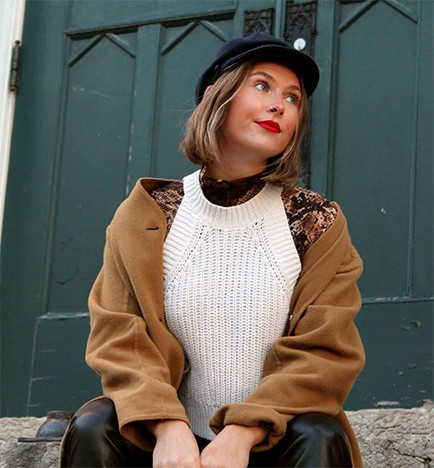
Avery Sims started Reformation Club, an online resale shop, in 2019.
The sellers
Avery Sims started her online resale shop, Reformation Club, almost two years ago after seeing other resellers on Instagram.
“Thrifting for me was just a way to express myself on a budget and curb that urge to always be getting new things while not contributing so overtly to fast fashion,” Sims says.
Her reselling process includes thrifting the pieces, washing them, taking photos and writing descriptions of items with outfit-pairing suggestions before posting to Instagram.
“Seeing people rock the clothing that I sell them and say ‘this is my favourite shirt now’ - that’s really fulfilling to me,” Sims says.
Closet Space is a 2SLGBTQIA+ clothing and gender-gear studio located inside the Revolution Wellness Centre.
The owner, Suzanne Reesor, doesn’t consider Closet Space a thrift store, “because it’s a very big combination of things.”
“This is a space where folks who are exploring some gender stuff through how they clothe themselves, (and they) are able to experiment with gender-affirming gear as well,” she says.
Around half the store is devoted to upcycled styles, a carefully curated collection of pieces drawn from thrifting and donations.
The shop receives a ton of donations, and Reesor chooses what makes the collection based on “who I know my clients to be, which is a great advantage I have after a year and a half,” she says.
Shopping at a thrift store is seen as an affordable, accessible option for people, but many find it overwhelming. Through her curated, upcycled collection, Reesor is “trying to alleviate shopping stress.”
Reesor wants to make the process simple for folks and carries an array of colours, sizes and femme, masculine and non-binary pieces in new condition, she says.
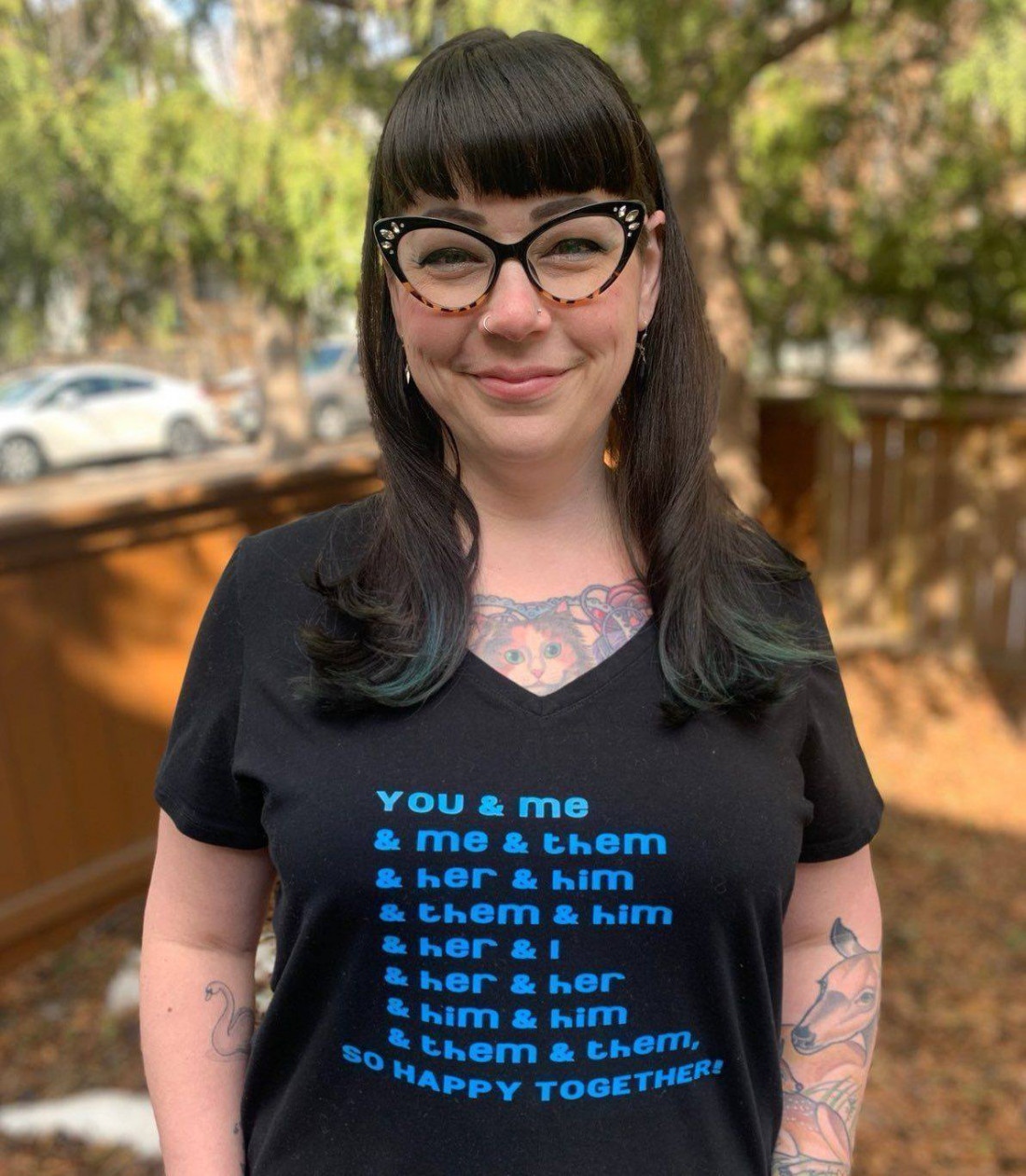
Suzanne Reesor is the owner of Closet Space.
Tess Gebel loved thrifting growing up and now runs wardrobetess, an online thrift resale business.
Gebel also works in film and costumes, where she avoids shopping in malls, because “it’s just so bad for the environment, so I try to source as much as I can for film from thrift, which is great,” she says, adding that thrifting for costumes is a common practice in the film industry.
In October 2020, Gebel started casually reselling on Instagram because she had a huge collection from thrifting and from film that weren’t her size.
“I get a lot of stock from ... thrift stores, estate sales (and) stock from film,” Gebel says.
Gebel carries many unique items in addition to basics and staple pieces. Above all, she wants her clothes “to have a good home.”

Thrift store The UpShoppe is a social enterprise of the North End Women’s Centre.
Facing critics and COVID
When COVID hit, causing province-wide shutdowns, it highlighted that thrift stores were mainly there to serve low-income communities, Sims says.
Sims loves that reselling allows her to pursue her love of fashion “in a sustainable way,” but thrift stores opening early made her and other thrifters reconsider what they’re doing outside of lockdown, she says.
“Thrift stores were one of the first things to open in the reopening plan, because the thought was more affordable clothing for people who can’t afford to shop online, for example,” Kristi Beaune, director of development and engagement at the North End Women’s Centre (NEWC), says.
Reesor has not thrifted during COVID. She currently relies on pre-pandemic thrifting and donations. There’s mindful discussion online about how thrift stores aren’t resellers’ spaces right now, she says.
“Stock has to be saved for folks who are shopping for themselves,” Reesor says.
Sims often thinks about the ethics of her business and has voiced these questions to her audience, creating a dialogue with them about the ethics of thrifting.
“A strength of thrift stores is having a wide base of people who use them,” Sims says, speaking to the missions of many thrift stores, which usually go beyond selling merchandise. These missions often include offering employment opportunities and putting money back into the community.
For example, the Canadian Goodwill’s mission “is to provide vocational and rehabilitation services and employment for persons with physical, developmental, mental, emotional or social challenges, which are obstacles to their employment in the open labour market.”
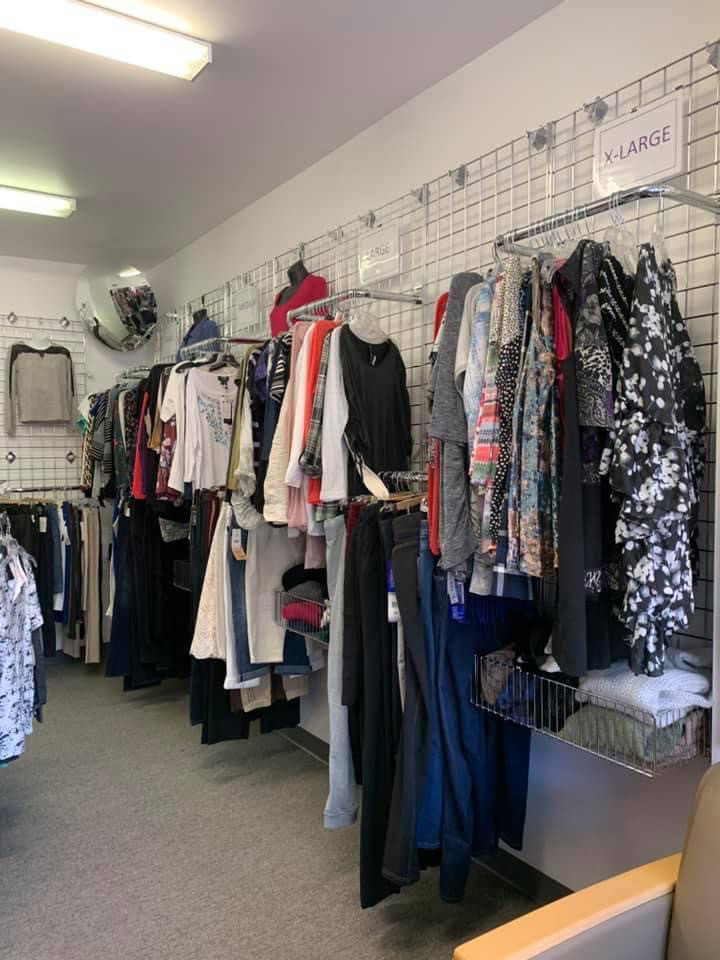
Inside the thrift store, The UpShoppe
The UpShoppe thrift store is a social enterprise of the NEWC.
“The nature of our business is to make sure that people in our community have access to affordable, high-quality things,” Beaune says.
The staff knows thrifters make purchases from UpShoppe with the intent to resell the items, she says.
“We don’t see it as a big issue, because we’re meeting our mission ... all the money that we raise rolls back into programming,” she says.
A prominent criticism of reselling is pricing and large markups that are thought to gentrify thrift stores by raising prices. There are “bad thrift resellers who charge ridiculous amounts for things, unfair amounts,” Gebel says, adding there’s a variety in quality and conscientiousness of sellers.
wardrobetess’ prices range from $10 to $40, rarely going over $60 for resale pieces.
Sims uses categories of pricing, usually asking between $10 and $15 for a shirt and rarely going over $30, for example, she says.
“I usually consider how much I bought it for, the condition of the item and keeping a couple dollars for myself,” she says.
Closet Space uses “standard retail prices,” meaning all shirts, whether from Calvin Klein or Walmart, sell for the same price, Reesor says.
Additionally, Closet Space is “pay what you can, if you can” with its upcycled collection.
“I actually challenge any thrift store to really think about why they don’t have a ‘pay-what-you-can’ model, because most of us are relying on donations, so if I receive something for free, it’s my ethical belief that if you cannot afford clothing, I am still going to provide them to you,” Reesor says.
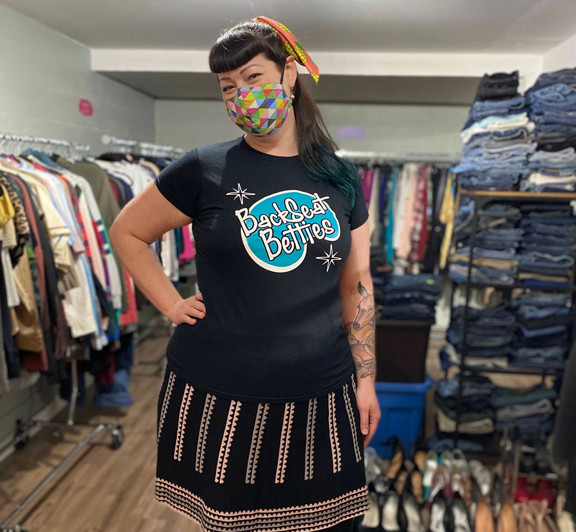
“If I receive something for free, it’s my ethical belief that if you cannot afford clothing, I am still going to provide them for you.” - Suzanne Reesor
Environmental impact
Despite criticism of the resale practice, one of the main drivers for selling is a move toward sustainability for consumers. According to the UN Act Now website, it takes “almost 7,500 litres of water to make a single pair of jeans,” a fact both Geber and Sims mentioned.
Fashion brands produce twice the amount of clothing now compared to the year 2000 and contribute between “8 to 10 per cent of global carbon dioxide emissions,” among other major environmental impacts, according to a report on nature.com.
“Thrifting has great ability to combat fast fashion,” Sims says. Her favourite part of thrifting is taking items that already exist and giving them new life. It’s a tangible way to reduce our ecological footprint, she says.
“There is so much clothing and so much textile waste in the world. Thrift stores are packed. Thrift stores are being filled with items every day. It’s not like there’s a shortage,” Gebel says.
“A lot of thrift stores throw out stock ... if it doesn’t sell quick enough,” Gebel says, noting her past experience as a thrift-store employee.
UpShoppe gets a lot of donations. They receive so much they sometimes refer people elsewhere and have limited days for donation intake, Beaune says. UpShoppe also uses a rag recycler that picks up overstock they don’t want or can’t sell, avoiding landfills.
Sustainability echoes throughout Gebel’s shop. She uses shopping bags recycled from film and compostable shipping bags.
Gebel also makes items from recycled clothes and fabrics. She uses “vintage fabric scraps, clothes that aren’t right for the site (and) stuff that is ripped or doesn’t sell” to make these pieces.
There are “people who would like to be thrifting and who would like to buy second-hand for the environment, but they don’t have the time. These resellers, those are a great option for people who don’t have the time or they’re looking for a very specific piece,” Gebel says.
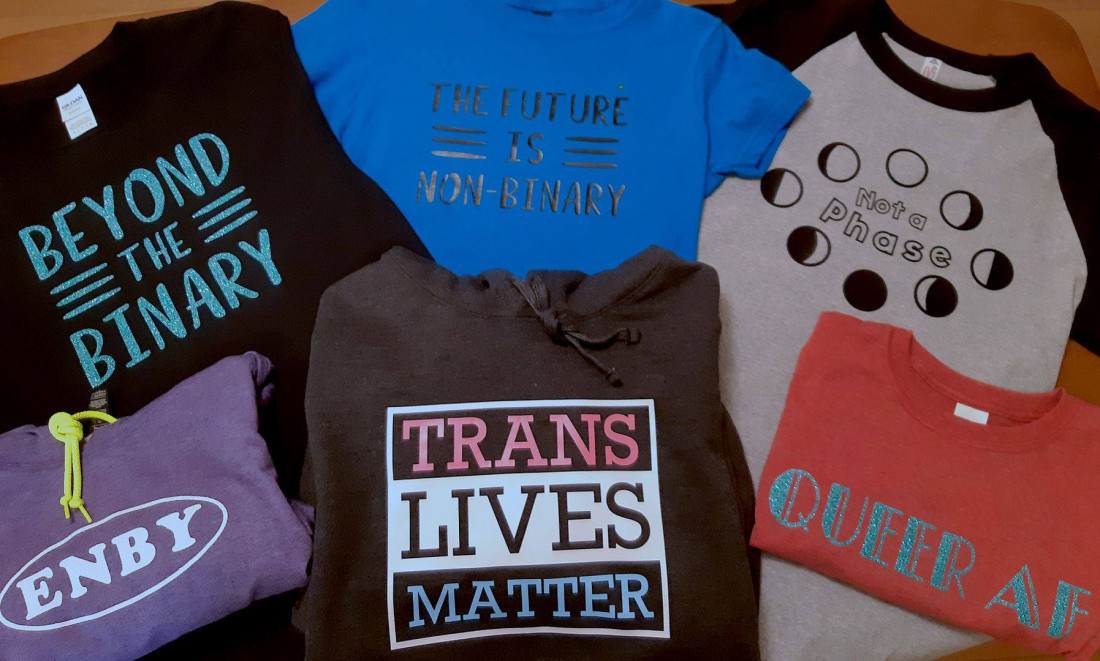
“I actually challenge any thrift store to really think about why they don’t have a ‘pay-what-you-can’ model.” - Suzanne Reesor
Visit @reformation_club on Instagram to see Sims’ collection and wardrobetess.com for Gebel’s picks. Closet Space is located at 433 Graham Ave. and is currently open by appointment only. Contact [email protected] to book one. For donations to UpShoppe, visit newcentre.org/upshoppe for guidelines or consider visiting another donation centre in the city.
Published in Volume 75, Number 21 of The Uniter (March 11, 2021)

